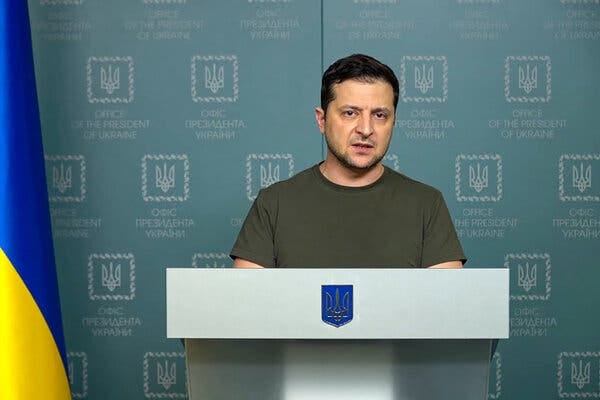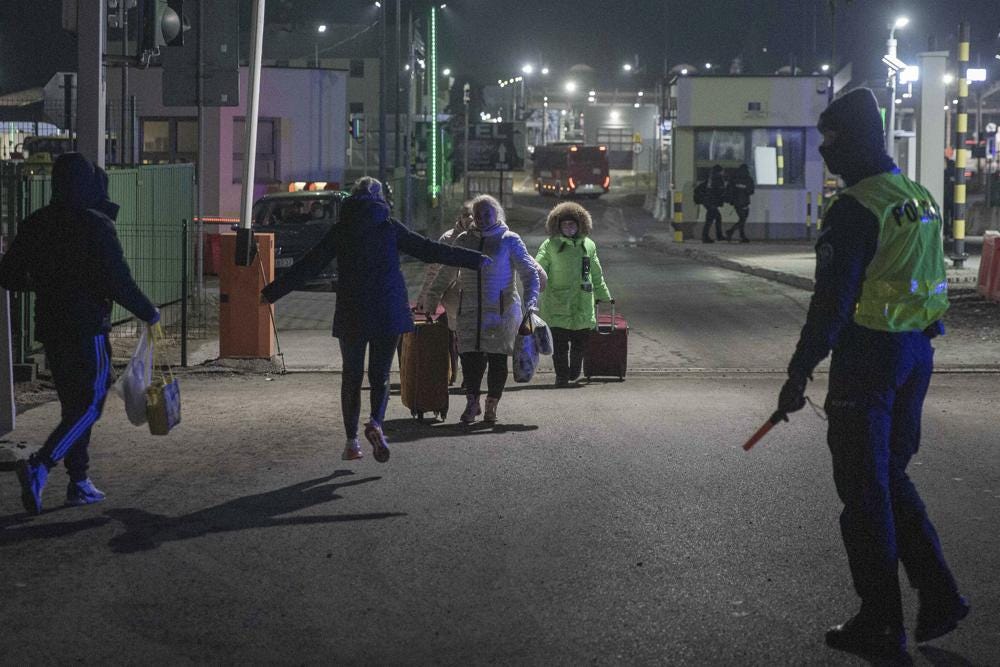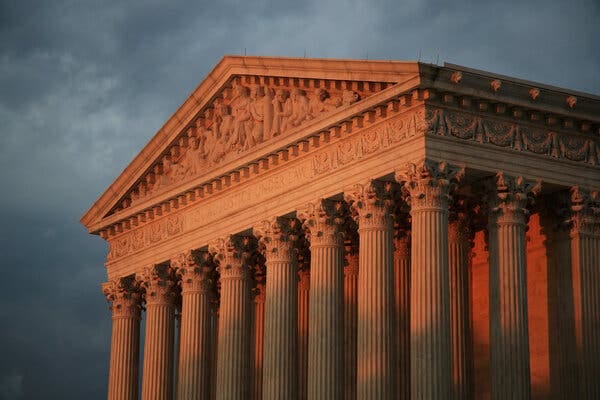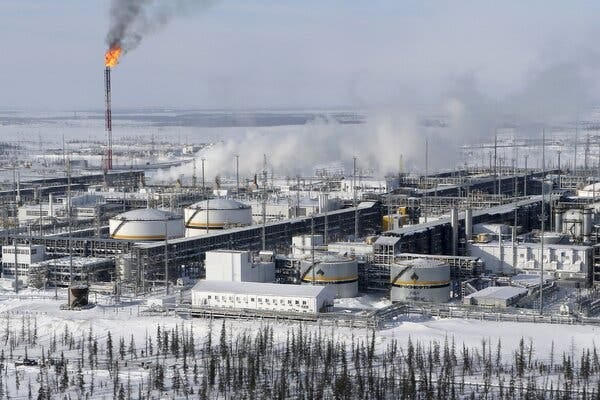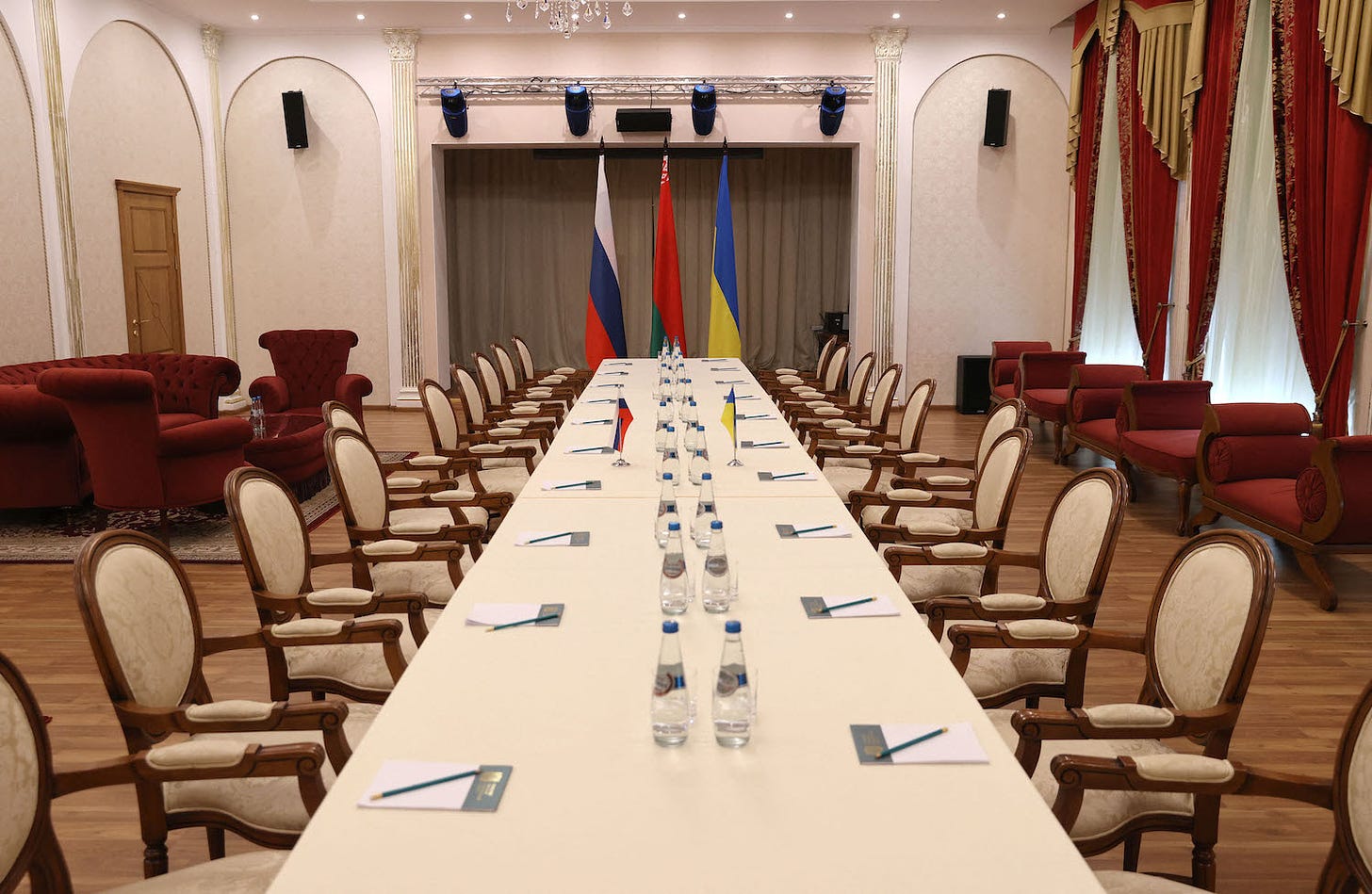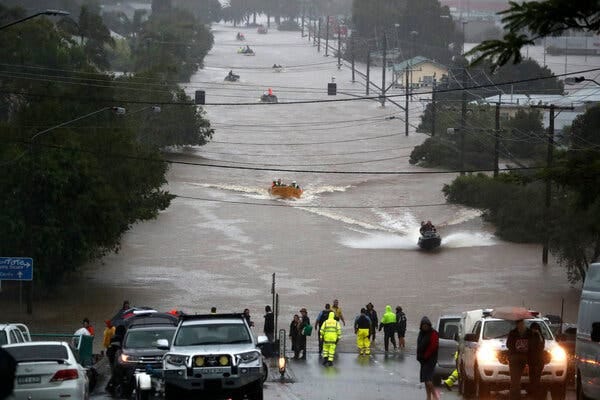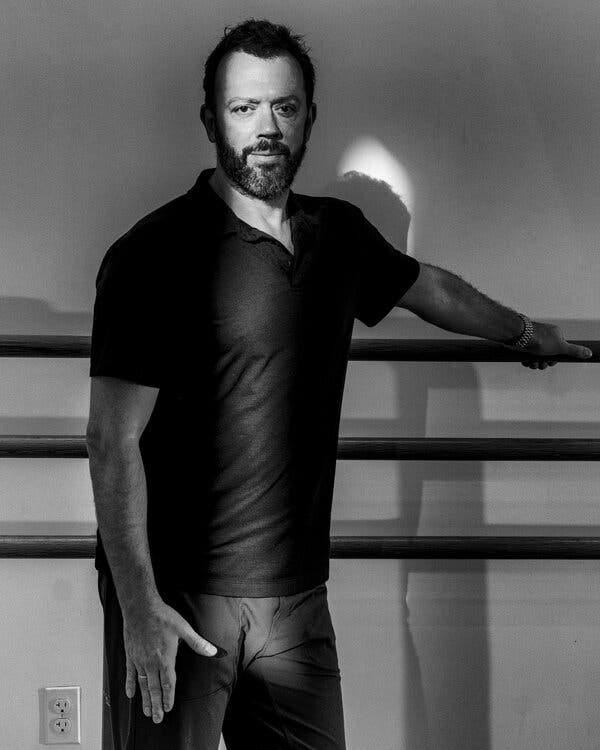The Full Belmonte, 2/28/2022
“WASHINGTON — When Vladimir V. Putin declared Sunday that he was putting his nuclear forces into ‘special combat readiness’ — a heightened alert status reminiscent of some of the most dangerous moments of the Cold War — President Biden and his aides had a choice.
They could match the move and put American forces on Defcon 3 — known to moviegoers as that moment when the Air Force rolls out bombers, and nuclear silos and submarines are put on high alert. Or the president could largely ignore it, sending out aides to portray Mr. Putin as once again manufacturing a menace, threatening Armageddon for a war he started without provocation.
For now, at least, Mr. Biden chose to de-escalate. The American ambassador to the United Nations reminded the Security Council on Sunday afternoon that Russia was ‘under no threat’ and chided Mr. Putin for ‘another escalatory and unnecessary step that threatens us all.’ The White House made it clear that America’s own alert status had not changed.
But to many in the administration, who spoke on Sunday on the condition of anonymity, it was a stark reminder of how quickly the Ukraine crisis could spin into a direct superpower confrontation — and how it may yet do so, as Mr. Putin tests how far he can go and threatens to use the ultimate weapon to get there.” Read more at New York Times
“KYIV, Ukraine — As Russian forces bore down on Ukraine’s capital and officials put the toll of civilian dead at more than 350 since the invasion began, the two countries agreed Sunday to sit down for talks ‘without preconditions,’ but hopes were not high for a peaceful resolution of the conflict.
Even as Ukraine’s president, Volodymyr Zelensky, agreed to send a delegation to meet with Russian officials near the border with Belarus, he said that he expected little to come of it. He declined to agree to any conditions or concessions before the talks, making it clear that he would not grant Russia the upper hand after its unprovoked attacks.
‘I do not really believe in the outcome of this meeting,’ he said, ‘but let them try to make sure that no citizen of Ukraine has any doubt that I, as a president, have not tried to stop the war.’
As world leaders moved to isolate Moscow and inflict heavy economic pain over the invasion, Russia showed little apparent interest in de-escalating.
President Vladimir V. Putin, denouncing the West’s ‘aggressive’ actions, said he had told his defense minister and his top military commander to place Russia’s nuclear forces on alert. Not only are Western countries imposing ‘illegitimate sanctions’ against Russia, Mr. Putin said, ‘but senior officials of leading NATO countries are allowing themselves to make aggressive statements directed at our country.’
In Ukraine, Russian forces were on the move in the south, threatening a major port, and in the north, where they were continuing their drive toward Kyiv.
But Ukrainian officials took some obvious satisfaction in Russia’s call for talks, which came as its forces met far more resistance than expected, failing to quickly seize the capital, Kyiv.
‘The enemy expected an easy walk, but got real hell,’ said Prime Minister Denys Shmyhal. Russia’s leadership, he said, ‘does not understand that it is at war not only with the armed forces of Ukraine, but with the entire Ukrainian people.’
But international military experts cautioned that the war is young.
They noted that Ukrainian forces are spread thin, with only limited ammunition, and that thousands of better-trained Russian soldiers have not yet been thrown into the fight. The worry is that Mr. Putin may move to harsher tactics, including the shelling of cities, if his forces get bogged down.” Read more at New York Times
“Zelensky, in a new video message today following a series of conversations on Sunday with presidents of Portugal, Lithuania, France and Poland as well as the prime ministers of Belgium, Spain and the United Kingdom, asked the European Union to admit Ukraine to the bloc on an emergency basis.” [The Hill] Read more at CNN
“GENEVA (AP) — The U.N. refugee agency said Monday that more than 500,000 people have fled Ukraine since Russia invaded the country last week.
U.N. High Commissioner for Refugees Filippo Grandi gave the estimate in a tweet.
The latest and still growing count had 281,000 people entering Poland, more than 84,500 in Hungary, about 36,400 in Moldova, over 32,500 in Romania and about 30,000 in Slovakia, UNHCR spokeswoman Shabia Mantoo said.
The rest were scattered in unidentified other countries, she said.” Read more at AP News
“Facebook's parent company Meta says it has discovered two separate Russian disinformation campaigns aimed at undermining trust in the Ukrainian government and hacking Ukrainian military and journalists. The campaigns were caught in its early stages.” Read more at NPR
“In the hotter and more hellish world humans are creating, parts of the planet could become unbearable in the not-so-distant future, a panel of the world’s foremost scientists warned Monday in an exhaustive report on the escalating toll of climate change.
10 steps you can take to lower your carbon footprint
Unchecked greenhouse gas emissions will raise sea levels several feet, swallowing small island nations and overwhelming even the world’s wealthiest coastal regions. Drought, heat, hunger and disaster may force millions of people from their homes. Coral reefs could vanish, along with a growing number of animal species. Disease-carrying insects would proliferate. Deaths — from malnutrition, extreme heat, pollution — will surge.
These are some of the grim projections detailed by the Intergovernmental Panel on Climate Change, a United Nations body dedicated to providing policymakers with regular assessments of the warming world.
Drawing on thousands of academic studies from around the globe, the sweeping analysis finds that climate change is already causing ‘dangerous and widespread disruption’ to the natural world, as well as billions of people around the planet. Failure to curb pollution from fossil fuels and other human activities, it says, will condemn the world to a future that is both universally dangerous and deeply unequal.
Low-income countries, which generate only a tiny fraction of global emissions, will experience the vast majority of deaths and displacement from the worst-case warming scenarios, the IPCC warns. Yet these nations have the least capacity to adapt — a disparity that extends to even the basic research needed to understand looming risks.
‘I have seen many scientific reports in my time, but nothing like this,’ U.N. Secretary General António Guterres said in a statement. Noting the litany of devastating impacts that already are unfolding, he described the document as ‘an atlas of human suffering and a damning indictment of failed climate leadership.’” Read more at Washington Post
“WASHINGTON — In the most important environmental case in more than a decade, the Supreme Court on Monday will hear arguments in a dispute that could restrict or even eliminate the Environmental Protection Agency’s authority to control the pollution that is heating the planet.
A decision by the high court, with its conservative supermajority, could shred President Biden’s plans to halve the nation’s greenhouse emissions by the end of the decade, which scientists said is necessary to avert the most catastrophic impacts of climate change.
‘They could handcuff the federal government’s ability to affordably reduce greenhouse gases from power plants,’ said Michael Oppenheimer, a professor of geosciences and international affairs at Princeton University.
But the outcome could also have repercussions that stretch well beyond air pollution, restricting the ability of federal agencies to regulate health care, workplace safety, telecommunications, the financial sector and more….
At issue is a federal regulation that broadly governs emissions from power plants. But in a curious twist, the regulation actually never took effect and does not currently exist.
The legal wrangling began in 2015 when President Barack Obama announced the Clean Power Plan, his chief strategy to fight climate change. Citing its authority under the Clean Air Act, the Obama administration planned to require each state to lower carbon dioxide emissions from the electricity sector — primarily by replacing coal-fired power plants with wind, solar and other clean sources. Electricity generation is the second largest source of greenhouse gas emissions in the United States, behind transportation.
But the Clean Power Plan was never implemented. After a barrage of lawsuits from Republican states and the coal industry, the Supreme Court put the program on hold. Once President Donald J. Trump took office, he instituted a new plan that was effectively the same as no regulation. But on the last full day of Mr. Trump’s presidency, a federal appeals court found that the Trump administration had ‘misconceived the law’ and vacated the Trump plan. That cleared the way for the Biden administration to issue its own regulation, which it has yet to do.
It is highly unusual for the Supreme Court to take up a case that revolves around a hypothetical future regulation, legal experts said.
‘Trying to figure out the contours of E.P.A.’s authority to regulate greenhouse gases when there’s no regulation being defended is just kind of a weird thing for the court to consider,’ said Jonathan Adler, a law professor at Case Western Reserve University. ‘I was surprised when they took the case.’
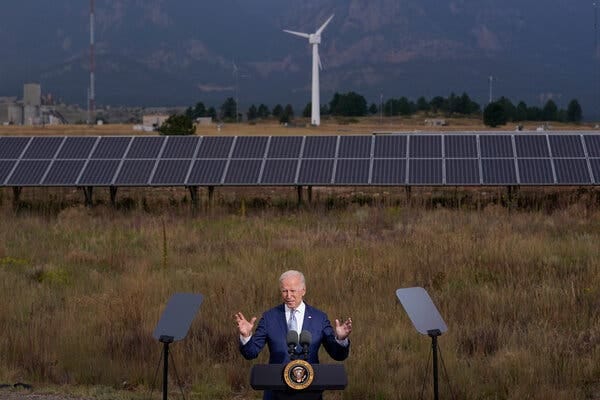
President Joe Biden spoke at the Flatirons campus of the National Renewable Energy Laboratory in 2021. Credit...Evan Vucci/Associated Press The plaintiffs in the case, West Virginia v. Environmental Protection Agency, want the high court to block the kind of sweeping changes to the electricity sector that defined the Obama Clean Power Plan.
Instead, Republican attorneys general in 18 states and some of the nation’s largest coal companies will argue that the 1970 Clean Air Act limits the E.P.A. to dictate changes only at individual power plants, not across the entire power sector.
Conservatives have long argued that the executive branch routinely oversteps the authority granted by the Constitution in regulating all kinds of economic activity.
‘This is really about a fundamental question of who decides the major issues of the day,’ said Patrick Morrisey, the attorney general of West Virginia, speaking at an event in Washington earlier this month, ahead of his appearance before the Supreme Court on Monday. ‘Should it be unelected bureaucrats, or should it be the people’s representatives in Congress? That’s what this case is all about. It’s very straightforward.’” Read more at New York Times
“BERLIN — It took an invasion of a sovereign country nearby, threats of nuclear attack, images of civilians facing off against Russian tanks and a spate of shaming from allies for Germany to shake its decades-long faith in a military-averse foreign policy that was born of the crimes of the Third Reich.
But once Chancellor Olaf Scholz decided to act, the country’s about-face was swift.
‘Feb. 24, 2022, marks a historic turning point in the history of our continent,’ Mr. Scholz said in an address to a special session of Parliament on Sunday, citing the date when President Vladimir V. Putin ordered Russian forces to launch an unprovoked attack on Ukraine.
He announced that Germany would increase its military spending to more than 2 percent of the country’s economic output, beginning immediately with a one-off 100 billion euros, or $113 billion, to invest in the country’s woefully underequipped armed forces. He added that Germany would speed up construction of two terminals for receiving liquefied natural gas, or LNG, part of efforts to ease the country’s reliance on Russian energy.
‘At the heart of the matter is the question of whether power can break the law,’ Mr. Scholz said. ‘Whether we allow Putin to turn back the hands of time to the days of the great powers of the 19th century. Or whether we find it within ourselves to set limits on a warmonger like Putin.’” Read more at New York Times
“US Capitol Police will once again erect a fence on Capitol grounds ahead of President Joe Biden's State of the Union address tomorrow. The fencing is an effort to heighten security and prepare for possible protests by big rig truckersin the coming days. The speech is a National Special Security Event, according to officials, and the Secret Service has been placed in charge of planning. Outside law enforcement agencies as well as the National Guard have been brought in to assist during the event.” Read more at CNN
“The first federal trial for a defendant connected to the Jan. 6 insurrection begins today in D.C. Guy Reffitt of Texas is charged with five counts, including obstruction, civil disorder and entering Capitol grounds with a firearm.” Read more at NPR
“The British oil giant BP said on Sunday that it would ‘exit’ its nearly 20 percent stake in Rosneft, the Russian state-controlled oil company, making it one of the first large companies to abandon Russia after its invasion of Ukraine.
BP, which is based in London, has worked in Russia for over 30 years, but the attack on Ukraine ‘represents a fundamental change,’ the company’s chairman, Helge Lund, said in a statement on Sunday. ‘It has led the BP board to conclude, after a thorough process, that our involvement with Rosneft, a state-owned enterprise, simply cannot continue.’
As Russia grows increasingly toxic in the world’s eyes — harsh sanctions are piling up, planes flying from Russia are being blocked from other nations’ airspace and protests are spreading — BP’s decision could encourage other companies to follow its lead.
Also on Sunday, Norway’s sovereign wealth fund said it would divest its Russian investments. Furthermore, companies that do business in Russia are bracing for repercussions on their bottom lines, as sanctions are poised to hobble Russia’s economy.” Read more at New York Times
Russia made dramatic moves to shore up its economy earlier today in the face of crippling Western-led sanctions. Its central bank has more than doubled its key interest rate from 9.5 percent to 20 percent, while exporters are now required to convert 80 percent of foreign exchange revenues to rubles as the currency falls to record lows against the dollar—the Russian currency was down nearly 30 percent against the dollar early Monday, and later recouped some losses.
The combination of Western actions and a stiff Ukrainian resistance appear to have sped diplomatic efforts, with Ukrainian and Russian delegations set to meet today on Ukraine’s border with Belarus amid reports that Minsk is prepared to join the Russian offensive against Ukraine. Expectations for any outbreak of peace are low, as Russian forces continue to penetrate Ukraine’s defenses in an advance to the capital Kyiv.
Going nuclear? Nuclear brinkmanship is now part of the conflict, following Russian President Vladimir Putin’s decision to place Russia’s nuclear weapons on high alert.
That it comes after Putin threatened retaliation to those that would interfere in Ukraine on a scale ‘you have never seen in your history,’ in a speech announcing the invasion last week only adds to fears of escalation.
There’s also the possibility that the announcement is all bluster and an attempt to distract. There are plenty of reasons for Putin to want the West, and indeed his own people, to look the other way.
One of those reasons is the unprecedented nature of the EU response to Russia’s actions.
New EU measures include a pledge to provide weapons, ammunition, and fuel to the Ukrainian army as well as a closure of EU airspace to Russian planes and the freezing of almost half of Russia central bank reserves.
But chief among the reasons why Putin would want a distraction is the war itself. It is still early days, but initial reports indicate that things aren’t going as planned. Ukraine’s deputy defense minister Hanna Malyar claimed that 4,300 Russian service members have been killed so far. She did not add how many Ukrainian service members had perished. At least 352 civilians have been killed since fighting began, Ukrainian officials reported on Sunday.
Germany’s ‘revolution.’ The EU’s new stance has come amid another sea change in policy, this time from Germany. As Jeff Rathke writes in Foreign Policy, Berlin has undergone a ‘revolution’ in its foreign policy over the Ukraine invasion. Breaking with previous stances on weapons transfers, Berlin will now provide anti-tank and anti-aircraft weapons to Ukraine. German Chancellor Olaf Scholz has also announced a $113 billion fund for the German military this year and will increase the annual German military budget to 2 percent of GDP.
Germany’s new stance may also reflect the realities Europe faces not just with Russia but also with the United States. Liana Fix, a resident fellow at the German Marshall Fund of the United States, told Foreign Policy that German worries about a return of an isolationist Republican party to the White House, whether in the form of Donald Trump or someone else, has spooked German policymakers. ‘While I think the main driver is the threat perceived from Russia, the feeling is that the reliance on the transatlantic relationship, as good as it is right now, might not last,’ Fix said.
A question of policy. After Putin’s nuclear comments, expect the phrase ‘escalate to de-escalate’ to become ubiquitous over the coming days. The term refers to Russia’s alleged strategy of using nuclear weapons to rapidly end a conventional conflict.
The only problem is it’s not quite settled among Russia analysts as to whether the doctrine even exists. That’s not to say Putin hews closely to written policy papers—the invasion already disproves that.
Olga Oliker, the Russia director at the International Crisis Group argues that a Russian nuclear strike would raise the stakes and bring in more NATO support for Ukraine rather than begin a process of de-escalation. ‘The detonation of a nuclear weapon in Europe, it doesn’t really matter if the country is designated as a NATO member state or not,’ Oliker told Foreign Policy, suggesting such an event would further unite the alliance and stiffen its resolve. (She has also provided an up to date assessment of Russia’s nuclear posture, including the conditions for using nuclear weapons).” Read more at Foreign Policy
“MELBOURNE, Australia — At least nine people have died from the flash flooding that has battered northeastern Australia in the past few days, with the wild weather forcing residents to evacuate and schools to close, while thousands of homes have been left inundated.
Queensland has been hit the hardest, with torrential rain pummeling towns and cities since last Tuesday and slowly moving south to engulf the state’s capital, Brisbane.
Photographs and videos from the city on Monday morning showed the Brisbane River extremely swollen and many streets severely flooded, with extensive damage to roads, buildings and vehicles caught in the downpour. Usually busy thoroughfares were submerged.
Up to 18,000 homes across the state have been affected, the authorities estimated, with about 15,000 of those in Brisbane. More than 1,500 people have been evacuated and about 53,000 homes were without power on Monday morning. Hundreds of schools are closed, and officials have asked residents to work from home. Residents have been asked to conserve water after flooding knocked a water treatment plant offline on Sunday. On Monday morning, the rain had eased and the Brisbane River had peaked at 12.6 feet. It was expected to peak again in the afternoon.” Read more at New York Times
“North Korea launched a ballistic missile off the east coast of the Korean Peninsula yesterday -- an ‘undesirable’ move for peace stabilization while the world is trying to resolve the Ukraine war, South Korea's National Security Council said in a statement. The launch is North Korea’s eighth test this year and comes nearly a month after Pyongyang fired what it claimed was its longest range ballistic missile since 2017. North Korea has ramped up its missile testing in 2022, announcing plans to bolster its defenses against the United States and evaluate ‘restarting all temporally suspended activities,’ according to state media.” Read more at CNN

From left, Eugenio Derbez, Marlee Matlin, Daniel Durant, Troy Kotsur and Emilia Jones of “CODA,” signing “I love you” at the SAG Awards.Credit...Mario Anzuoni/Reuters “And the winner is … the Screen Actors Guild?
After a topsy-turvy few months that saw the Golden Globes reduced to live-tweeting and the Critics Choice Awards delayed to March, the Screen Actors Guild Awards on Sunday found itself in the unusual (and influential) position of being this Oscar season’s first televised show.
In a diffuse year when many of the acting awards still feel up for grabs, that could spell good news for Sunday’s high-profile honorees, who included Troy Kotsur, named outstanding supporting actor for ‘CODA,’ Ariana DeBose, best supporting actress for ‘West Side Story,’ and lead-acting winners Will Smith (‘King Richard’) and Jessica Chastain (‘The Eyes of Tammy Faye’).
Many of those winners were overcome at the recognition from their guild. ‘I’ve been a member since 2001, and now I feel like part of the family,’ said Kotsur, who recalled nights spent sleeping in his car and dressing room.
Smith, considered the Oscar front-runner, began tearing up when the show ran a clip from “King Richard,” in which he plays the father of tennis superstars Venus and Serena Williams. ‘That may have been one of the greatest moments of my career just now,’ Smith said, ‘because my name was called for ‘King Richard’ sitting next to Venus Williams.’
(On the television side, ‘Succession’ and ‘Ted Lasso’ won top cast honors, while Lee Jung-jae and HoYeon Jung of “Squid Game” took lead performer honors.)
Though the SAG Awards are considered among the more important Oscar precursors, recent winners have sometimes diverged from precedent. Both of the lead actors who took SAG Awards last year — Chadwick Boseman and Viola Davis from ‘Ma Rainey’s Black Bottom’ — lost the Oscar. And of this year’s SAG races, only one category — best actor — matched Oscar’s picks five for five. In the supporting categories, the overlap was much slimmer, and only two of the five SAG nominees also received Oscar nominations.
Still, the four SAG film winners are all contending for an Oscar, as is ‘CODA,’ a film about a deaf family and its hearing daughter that is nominated for best picture. ‘You are all our peers,’ signed the cast member Marlee Marlin upon accepting the best-ensemble award. ‘We, deaf actors, have come a long way.’” Read more at New York Times
“JUPITER, Fla. (AP) — Major League Baseball negotiations to end the lockout are extending to the limit.
Management says a deal must be reached by the end of Monday’s negotiations to salvage a March 31 start to the regular season and a 162-game schedule.
With that in mind, the sides are scheduled to meet starting at 10 a.m., three hours earlier than usual. This will be the eighth straight day of talks at Roger Dean Stadium, the vacant spring training home of the Miami Marlins and St. Louis Cardinals.
The lockout is in its 89th day. MLB has not fixed an exact time to the deadline, which leads to the possibility of bargaining sessions stretching into the wee hours if both sides see a deal within reach.
Sides were still far apart, but pressure is increasing. Players would lose $20.5 million in salary for each day of the season that is canceled, according to a study by The Associated Press, and the 30 teams would lose large sums that are harder to pin down.” Read more at AP News
“The choreographer Alexei Ratmansky, the former artistic director of the Bolshoi Ballet who is now artist in residence at American Ballet Theater, was preparing a new ballet at the Bolshoi in Moscow when President Vladimir V. Putin of Russia made his announcement, early Thursday morning, that he had launched an invasion of neighboring Ukraine.
Mr. Ratmansky, who grew up in Kyiv and danced there early in his career, immediately decided to leave Moscow, and with the help of the Bolshoi, made arrangements to travel home to New York via Warsaw, along with the rest of his international creative team.
‘It was as if we were on a fast-moving train, rushing toward the finish,’ Mr. Ratmansky said of the rehearsal period, in an interview on Saturday. ‘The news was bad, but I was absolutely torn between creation, love and desperation — all these words. I thought, if actual military action begins, I won’t be able to continue, but until then, I’ll try to ignore the news and be professional and just do my work.’
The ballet, set to Bach’s ‘Art of the Fugue,’ was to have its premiere on March 30 but has been postponed indefinitely. The head of the Bolshoi’s press office, Katerina Novikova, when asked for a comment, pointed to a statement on the theater’s website, which says that it was postponed after ‘negotiations with the staging team.’” Read more at New York Times
“Lives Lived: Leo Bersani was a scholar of French literature, but he found renown for his argument that gay men should embrace a more radical lifestyle that rejected the rules of male-female relationships. He died at 90.” Read more at New York Times




